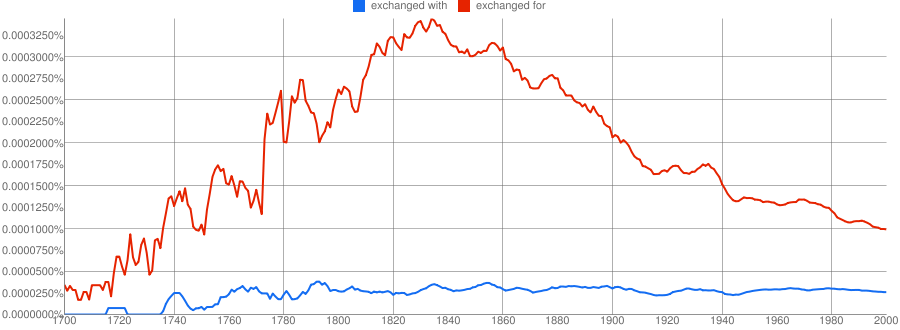Is "exchanged with" grammatically correct and does it mean the same thing as "exchanged for?" "For" and "with" don't normally seem interchangeable, so these two phrases should be different, yet they seem similar.
4 Answers
Exchange with a person you are transacting with
I exchanged wares with the baker today.
Exchange a thing you spent for a thing you received as in a purchase or scheme
I exchanged a sack of flour for a rhubarb pie.
Exchange one thing with another if you control both of them (less frequent)
It wouldn't all fit in my bag, until I rearranged the things in my bag by exchanging the pie with the dictionary.
-
I think you're on to something there, but I'm not sure exactly what. It seems for is more normal where both items being exchanged are mentioned, whereas with can be used where only one (or indeed, neither) are explicitly named in the sentence. Commented Jun 22, 2011 at 18:19
It may be that for some speakers, and/or in some contexts, the two expressions are interchangeable, but I don't think that applies to most usages.
Exchanged with is relatively uncommon. It's used when sub-elements of a system under consideration are being altered for some reason (optimisation, analysis, etc.) And in the sense of exchanged correspondence/contracts/currency/etc. with.
Exchanged for, the more common form, generally implies a transaction (barter, swap, whatever) between two parties. Normally in contexts where one or both 'exchangers' consider the exchange to be at the very least 'fair', if not actually 'advantageous'. These are not relevant issues in the contexts outlined above where with is normally used.
 LATER: It's been pointed out that there are specific contexts where the two usages would be considered different by almost all speakers, even if they wouldn't conciously acknowledge or adhere to the distinction given above.
LATER: It's been pointed out that there are specific contexts where the two usages would be considered different by almost all speakers, even if they wouldn't conciously acknowledge or adhere to the distinction given above.
Here is an NGram specifically graphing written usage of exchanged for him compared to exchanged with him. If you leaf through some of them, you'll see that the vast majority of references to with are in the specific contexts specified above, even though these contexts represent a tiny proportion of all references to 'exchanging' in general.
-
1
-
1
-
Any references for those usage definitions? They sound very plausible, but some backup would be nice. I might also be worth mentioning that "exchange with someone" and "exchange for someone" have entirely different meanings.– user1579Commented Jun 22, 2011 at 11:56
-
@Rhodri: as @Ham and Bacon noted, it's an NGram graph. I just spent a couple of minutes leafing through a few pages of the reported instances in their indexed books to confirm what I already suspected. Of all things that may be exchanged, 'people' aren't particularly common. So I didn't consider that special difference, because OP only seems to be asking about standard usage for standard situations. Perhaps I should add that subtle distinction anyway - I just didn't want to confuse the issue first time around. Commented Jun 22, 2011 at 18:03
-
1Sorry, I meant to ask if you could cite sources on the definitions you give for "exchanged with" and "exchanged for", that would be very useful for the future. I should probably have also been clearer that in both "exchange with someone" and "exchange for someone", the person is participating in the exchange, not being exchanged. These are common usages, and may be messing up your Ngrams.– user1579Commented Jun 22, 2011 at 18:14
Usually this column is very helpful, but here, respondents are not answering the key problem - i.e., which is the "new" (the replacement), and which the "old") (the replaced), in usage such as "XYZ was exchanged for ABC". It is just assumed that the reader understands (I assume XYZ to be the new). In academic Konglish (Korean English), the phrase "XYZ is exchanged to ABC" is quite often used, and I still have not been able to figure out which way around it applies, i.e., which is the new and which the old. But which is which is the key issue, to avoid ambiguity - which can be critical in scientific papers. (In Konglish, there are other similar uses of "to" that make the native reader pause, and wonder which order applies).
"Exchanged with" and "exchanged for" are interchangeable.
There is only one instance, in which "exchanged with" must be used, and that is referring to the time when you are exchanging with somebody i.e.
I exchanged with John/I exchanged for John.
Usually, "exchanged with" can be interchangeable with "exchanged for", but in this case, you can see that this is not possible. It's only these instances that "exchanged with" is needed.
-
As I'm sure you realise, I agree with you that in general, semantically and grammatically both forms are interchangeable, and neither is meaningfully more 'correct' than the other. As for 'special exceptions' such as the example you give, I'm inclined to agree. But I'm not yet sure exactly why, or what the defining characteristics of the exceptions are. It would be nice to chase this one down a bit more. Commented Jun 22, 2011 at 18:11
-
I don’t agree that they are genetically interchangeable, even with the caveat. “I exchanged a book for a pen” doesn’t retain its meaning when you change for to with.– LawrenceCommented Jan 29, 2019 at 14:41
